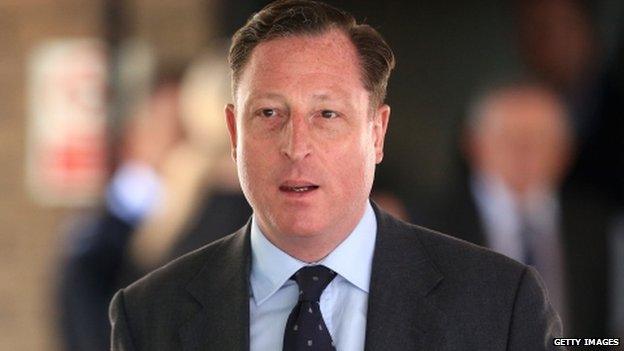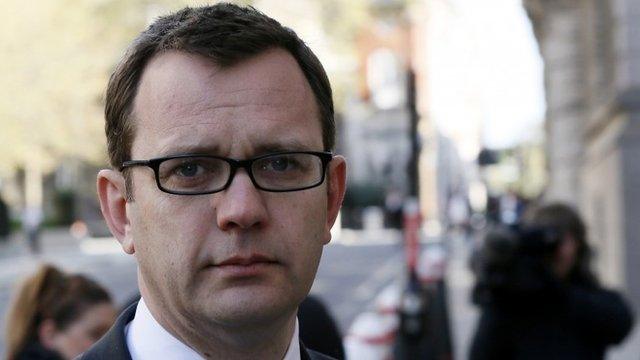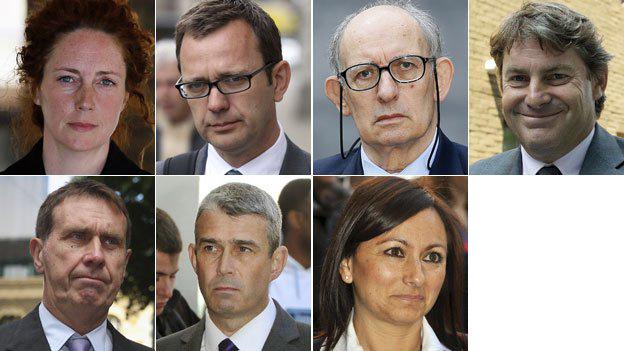Phone-hacking trial: Coulson 'listened to Blunkett voicemails'
- Published
Tom Symonds reports on Mr Coulson's third day on the stand
Andy Coulson has revealed for the first time that he did listen to private voicemail messages relating to former home secretary David Blunkett.
The ex-News of the World editor said that when he did so in August 2004 it was "the first and the only time voicemail messages were played to me".
He told the hacking trial he now knew the material "was the product of an illegal act", but was not aware then.
Mr Coulson, 46, denies the charges against him.
He is accused of conspiracy to hack phones and conspiracy to commit misconduct in a public office.
Mr Coulson, who became Downing Street director of communications after leaving the News of the World, is testifying at the Old Bailey for a third day.
He was also asked about using the phrase "do his phone" in an email, which he said was not a reference to hacking TV celebrity Calum Best's mobile phone but was in relation to an inquiry into a reporter at the paper.
'Breach of privacy'
On Tuesday, Mr Coulson told the trial he was not aware in 2002 that phone hacking was illegal.
However, he said he was "shocked" and "angry" when reporter Neville Thurlbeck first told him he had heard voicemails showing Mr Blunkett was having an affair with Kimberly Quinn, a former publisher of the Spectator magazine.
"I know I was quite angry about it and I used some reasonably colourful language and said to him words to the effect of, 'What an earth do you think you are doing?'"
He said he viewed the then-home secretary as "a friend of the paper" and the intrusion into his voicemails as "a breach of privacy", and ordered any "investigation" into the MP to stop.

Neville Thurlbeck has admitted being involved in phone hacking
However, he said the reporter pitched the story again later and played him extracts from the messages.
He said Mr Thurlbeck argued the story was in the public interest because it showed Mr Blunkett was "distracted" from the job of home secretary and had mentioned sensitive details in the messages, which could be a security issue.
Asked if he challenged Mr Thurlbeck about where the messages had come from, he replied: "I made an assumption... that Neville had done this himself... It was all coming from Neville."
Mr Coulson said he later began to take the view that the story should be pursued and decided he would confront Mr Blunkett directly with the allegation.
He said he had initially planned to tell the minister about the voicemails, but changed his mind to "minimise" the "risk" of "a privacy claim against the paper", and avoid the possibility that publication would be blocked by an injunction.
This, he said, was a "mistake", and even though doing so could have resulted in legal action, it "would have brought the whole thing to a head".
Agreed facts
The jury was then played a recording made by Mr Blunkett - with Mr Coulson's knowledge - of a meeting in which Mr Coulson confronted the home secretary about the affair and heard the minister repeatedly asking what evidence he had.
In reply, Mr Coulson said he had "extremely reliable sources", but did not mention the intercepted messages.
Mr Thurlbeck has already admitted being involved in phone hacking.
It is part of the agreed facts in the case - not disputed by either side - that recordings of voicemails involving Mr Blunkett were found in a safe at the newspaper.
Mr Coulson was also asked about the News of the World's pursuit of another former home secretary, Charles Clarke, and his then special adviser, Hannah Pawlby.
Mr Coulson said he was "aware" of gossip the two were having an affair, but said he was told by the News of the World's political editor it "wasn't true".
The court has previously heard that the allegations were untrue and the story was not published.
The court was played two voicemails Mr Coulson left on Ms Pawlby's phone on the same day in June 2005.
'Leak concerns'
These calls were not related to the affair rumours and were probably to do with a story about Great Train Robber Ronnie Biggs, Mr Coulson told the court.
He was then asked about an email in which he used the phrase "do his phone".
Mr Coulson said it was an instruction for News of the World staff to check the mobile phone call data of the paper's showbiz reporter, Rav Singh, to see if he was "sharing too much information" with showbiz reporters from rival Sunday papers.
The jury has heard that the News of the World staff were often concerned about the possibility of stories "leaking" to rival publications.
Mr Coulson's barrister, Timothy Langdale QC, asked whether the instruction had anything to do with the hacking of Mr Best's mobile phone.
"No it did not", Mr Coulson replied.
Mr Coulson said he "reluctantly" agreed for Mr Singh's phone calls to be investigated and checked with his human resources department to see if it was "a proper thing to do".
He said: "I was in no doubt this was not an instruction to anyone to hack anybody's phone".
Mr Coulson is the last of seven defendants, who deny all charges against them, to give evidence.
- Published14 April 2014

- Published25 June 2014
